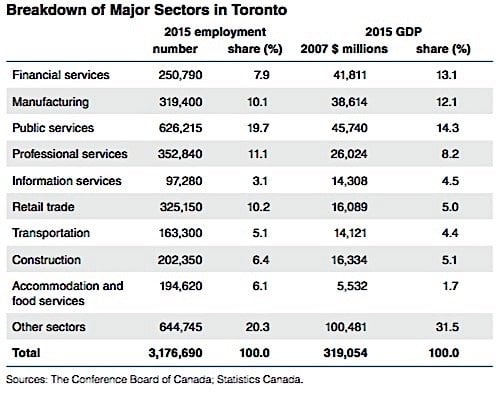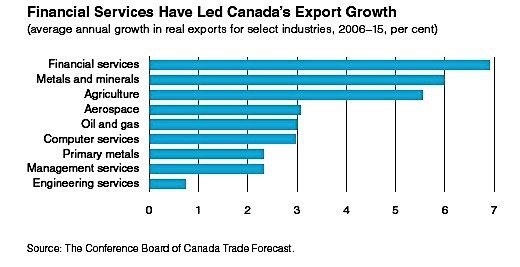
Toronto’s financial services sector continues to grow and increase in importance to both the local and the Canadian economy. A new report from the Conference Board of Canada on the industry says that financial services accounted for 7.9 per cent of employment in Toronto, with 250,790 people working directly in that industry, and an additional 208,890 in indirect jobs.
Financial services workers are better paid than workers in other industries. On average they earned $1,260 weekly, compared to $963 for all industries. The top five job areas, or core strengths in the industry, are retail and corporate banking, investment banking, wealth management and pension fund/mutual fund management (the securities industry), and life and health insurance.
Toronto now accounts for 31.7 per cent of all Canada’s financial services employment, and 43 per cent of head office employment. Employment has grown by 21 per cent over the past decade, while its contribution to the city’s GDP was 13.1 per cent in 2015. The report says that the financial services industry is becoming more and more concentrated in Toronto.

The value of the financial services sector goes beyond the jobs and GDP it supports. Its larger role is to act as a facilitator for the economy, giving both consumers and businesses access to credit, processing their transactions, providing risk management services. The sector links the economy together “in a unique way,” as every single business across the country, as well as most individuals, use it every day. Only telecommunications and transportation have a similarly pervasive effect on the functioning of the economy.
Redistributing capital, otherwise known as lending and borrowing, is a core function of the financial services sector, and on this score Canada, and Toronto, is ranked very high in the world. Without access to capital sources, economic growth would be impossible. Canada is currently ranked fifth in the world by the World Economic Forum for its availability of financial services.
Canada is also one of the top three countries in the world, after the United States and India, for the number of publicly listed companies. Canada ranks ninth in the world in the value of stocks traded, relative to the size of GDP. A key reason for the large number of companies listed is the country’s mining sector. Mining companies accounted for 45 per cent of all firms listed on the TSX and TSX Venture exchanges, and 37 per cent of their market capitalization, the report says. In all, 53 per cent of global mining finances were done on the TSX or TSXV in 2015. In the first six months of 2016, $39.9 billion was raised on the two exchanges, the equivalent of nearly one-third of all business investment in Canada for that period.

When we think of exports, we tend to think of manufactured goods, like cars and airplanes, and agricultural products. But financial services is now the fastest growing of Canada’s services sectors in terms of exports. Exports more than doubled in the years 2005–2015, reaching $11.7 billion in 2015. These exports consist mainly of banking, insurance, and other financial services provided by Canadian companies to non-residents of Canada.
In 2015, more than one-third of revenues from Canada’s five largest banks came from the US and other international markets. Toronto’s largest life insurance companies, meanwhile, Manulife Financial and Sun Life, generated 70 and 55 per cent of their revenues respectively in countries other than Canada.


































